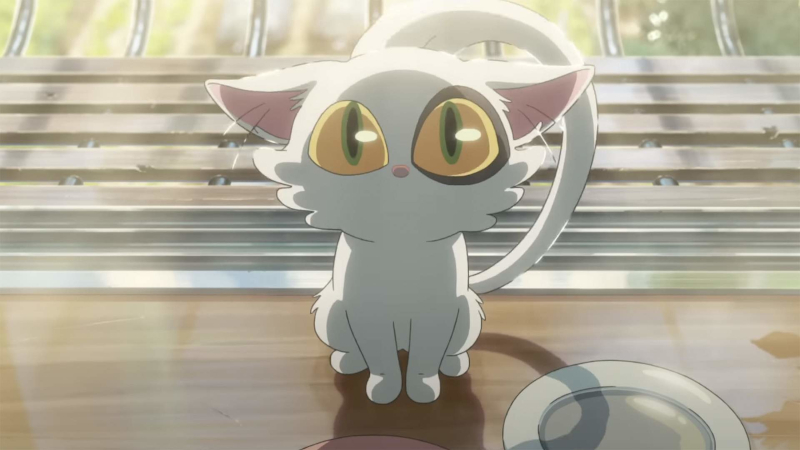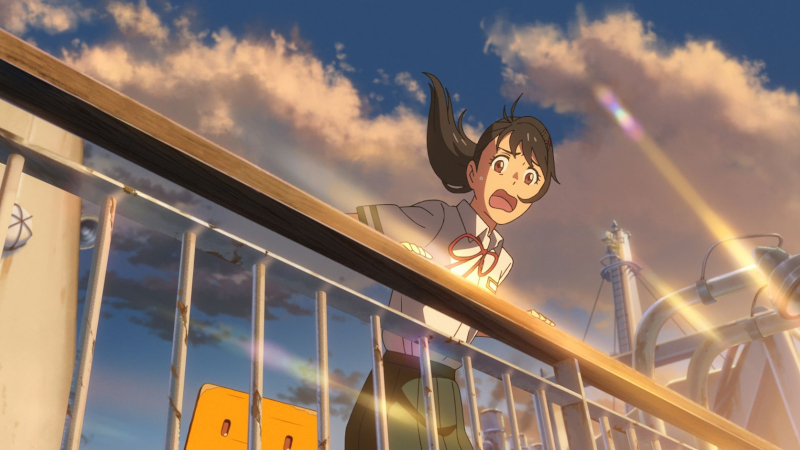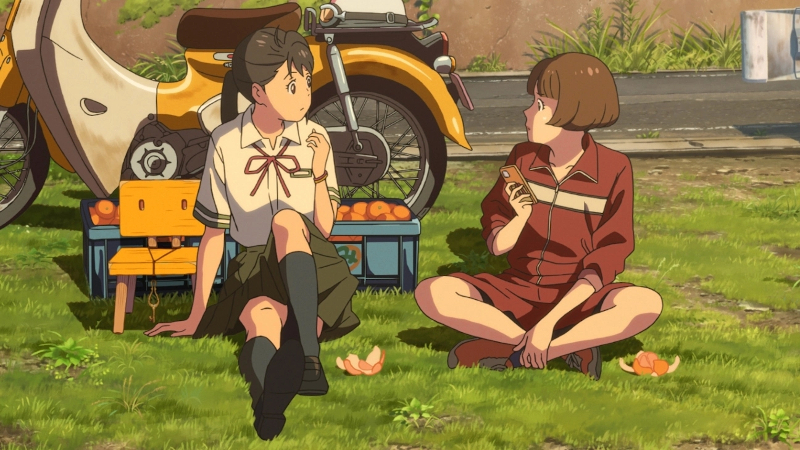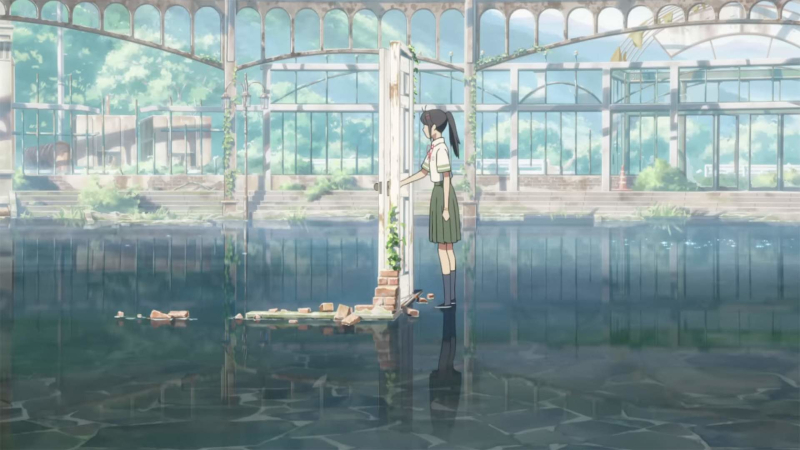Director – Makoto Shinkai – 2022 – Japan – Cert. PG – 122m
***1/2
Aided by a man turned into a mobile, talking, three-legged chair, a schoolgirl must prevent giant, freak weather ‘worms’ from devastating Japan with earthquakes – anime feature is out in UK and Irish cinemas on Friday, April 14th
Prompted by a question from a man she meets on a road in her hometown, 17-year-old schoolgirl Suzume visits an abandoned hot springs facility in which is situated a door in a free standing door frame. She opens it only to find she can’t enter. Shortly after this, in school, she notices smoke in a gigantic, red and black worm-like form rising from the hot springs facility.
At the same time, everyone around her receives earthquake warnings on their smartphones, but no-one else can see the rising form. She goes back to the facility to find the man she met trying to close the door and cut off the incoming smoke, something she helps him to do. They do not close the door in time to prevent the red and black form falling onto the land and an earthquake resulting. The man locks the door using a key on his person.
At her house, the man, whose name is Sota, explains to Suzume that there are many other such portals through which these worms can enter our world and cause earthquakes. A talking cat turns up which appears to be the embodiment of the key which locks these portals. Next, Sota finds himself mysteriously turned into an old three-legged child’s chair (a four-legged chair missing one leg) in which form he is able to both speak and move around.

Thereafter, the narrative switches to a road movie, with the pair travelling around Japan trying to find and lock these doors to prevent earthquakes while Suzume’s concerned aunt, who has taken care of Suzume since the girl’s mother died many years ago, in pursuit.
Shinkai’s latest offering is nothing if not generic. His massive hit Your Name (2016) was the first of his films I saw, and that felt at the time (and on subsequent rewatching) like a breath of fresh air in the world of anime. But his two subsequent features Weathering With You (2019) and this new film feel like more of the same, an artist with something to say but once he’s said it once, further repetition adds little.
Basically, it boils down to, Japan is a country beset with natural disasters in the form of earthquakes and the national psyche has to somehow deal with them. In recent memory, specifically in 2011, in events known to viewers of Suzume’s age, the country suffered a huge earthquake and tsunami not to mention nuclear plant meltdown.

Further back, Japan was the country on whom atomic bombs were dropped, on the cities of Hiroshima and Nagasaki, a horror articulated in the country’s cinematic output of the city-stomping, fire-breathing Godzilla (Ishiro Honda, 1954) and its numerous kaiju (giant monster) sequels and spin-offs. (The inevitable Hollywood remakes and sequels seem to lose something by divorcing the franchise from Japan.)
The worm forms here which rise up from portals to cause earthquakes, although here meteorological in nature rather than than flesh and blood creatures, and thus linked to the meteor showers of Your Name or the rain in Weathering With You, seem to be a direct descendent of Godzilla (perhaps those other Shinkai meteorological phenomena can now be read as similarly inspired, but at the time it seemed less obvious).
Shinkai, who writes his own films, is not alone in such kaiju ideas: they appear to be floating around ripe for expression in Japanese culture. The novelist Haruki Murakami’s short story Superfrog Saves Tokyo likewise features a giant worm (not meteorological, this one actually IS a giant worm) who angrily bursts out of the depths and threatens to devastate Tokyo with an earthquake; the story is one of the six that comprise the cleverly worked through narrative of independent French animation Blind Willow, Sleeping Woman (Pierre Földes, 2022).

But where Blind Willow, Sleeping Woman’s director has arrived at his own, very distinctive and highly idiosyncratic form of animation, here Shinkai seems largely content to merely ape the predominant visual tropes of much anime and manga rather than find a more individual style in the manner of (to name but four) Hayao Miyazaki (My Neighbour Totoro, 1988), Katsuhiro Otomo (Akira, 1988), Satoshi Kon (Perfect Blue, 1997) and Mamoru Hosoda (Belle, 2021).
Thus, Suzume seems full to the brim with doe-eyed schoolgirls (including the protagonist), an even cuter-eyed pussycat that might have wandered out of a Pokémon cartoon and background art and settings that feel like you’ve seen them in a thousand Japanese anime features or small screen outings. To be fair, the background art and settings are lavishly rendered with a commendable level of attention to detail (meaning they look fantastic on a really big screen), but you can’t help but wish they weren’t so slavishly generic.
However, Shinkai’s film sometimes breaks free from convention to experiment, and where it does so, the dividends prove massive. The most original element is the man turned into a three-legged chair who moves around like a tripod and falls over when he falls asleep. The cat, if derivative, is fun; the scene where the girl pursues the chair down the street as it chases after the cat is both winsome and strangely compelling. Other highlights include the cat going viral on pictorial, Japanese social media (which sounds pretty odd but isn’t so far from the social-media-heavy content of Belle).
Shinkai’s attempts to deliver audiences the familiar may serve his career well in the short term, but it would be nice to see him broadening out his style to something a little more original in the longer. Which is not to say, exactly, that I don’t like the film: on some level, I really enjoyed it. Yet he clearly remains a very creative talent who I can’t but help think is capable of so much more than he delivers here, if only he wouldn’t play so deliberately and cynically to the crowd.
Suzume is out in cinemas in the UK and Ireland on Friday, April 14th.
Trailer (subtitled):
Trailer (US English dubbed):
